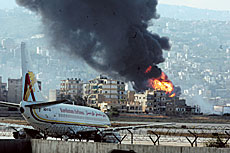BEIRUT, 15 July 2006 — Hezbollah chief Hassan Nasrallah declared “open war” against Israel yesterday after emerging unscathed from an Israeli airstrike on his home and office in the Lebanese capital.
“You wanted an open war, you will get an open war,” Nasrallah said in a defiant audio message after the evening raid, the latest salvo in an escalating Israeli air campaign against Lebanon over Hezbollah’s capture of two Israeli soldiers on Wednesday.
“It will be war at all levels... to Haifa, and beyond Haifa,” Nasrallah said, referring to Israel’s third largest city which commanders there said came under unprecedented rocket fire from Lebanon on Thursday.
An Israeli military spokeswoman declined to describe the evening airstrike as an assassination attempt against the 45-year-old Hezbollah chief. She would confirm only that “Hezbollah terror organization headquarters was targeted.” But Israeli television said that it was a calculated attempt against Nasrallah’s life carried out in response to specific intelligence on his whereabouts.
Hezbollah television said the strikes “destroyed the building that hosts Hezbollah’s secretariat general” and that Nasrallah’s house was hit. It was not immediately clear whether he had been in the targeted area.
Nasrallah refused to be fazed by the raid on his home, promising Israeli commanders “surprises” in the movement’s resistance to its three-day-old onslaught.
The Hezbollah chief hailed a rocket attack launched from the southern suburbs of Beirut against an Israeli naval vessel patrolling offshore yesterday evening as a first example.
An Israeli military spokeswoman confirmed only that “there was a navy ship that was lightly hit along the Lebanese shore,” and declined to talk about casualties.
The attack on Nasrallah’s home and office, which Hezbollah television said his family and bodyguards also survived, was the latest barrage in an escalating Israeli campaign against the movement’s political and military infrastructure.
The group’s command headquarters in the southern suburbs had already come under repeated Israeli air attack, as had the transmitters of its radio and television channels.
Israeli Prime Minister Ehud Olmert insisted yesterday that the offensive in Lebanon would go on until Hezbollah released the two captured soldiers, halted rocket attacks against northern Israel and disarmed.
Hezbollah insists there can be no question of releasing the two Israelis unless Palestinian and Arab prisoners held in Israeli jails are freed in return, and Nasrallah said in his speech that the Israeli demands amounted to “total war.”
“You wanted to change the rules of the game,” he told the Israelis. “Today is total war. Either we submit to enemy conditions, and American and international and unfortunately Arab pressures ... or we resist ... and I promise you victory again,” he told his supporters.
Meanwhile, the UN Security Council debated the violence in Lebanon in an emergency meeting yesterday that ended with no action on Beirut’s demand for an immediate end to Israeli airstrikes on its territory.
The debate highlighted divisions in the council, with the United States standing alone in refusing to even caution restraint from Israel over its military offensives in both Lebanon and Gaza. US Ambassador John Bolton laid sole blame for the escalating violence in the region on Iran and Syria and their support for groups like Hezbollah and the armed wing of Hamas. “Syria and Iran must be held to account for supporting regional terrorism and their role in the current crisis,” said Bolton. “All militias in Lebanon, including Hezbollah, must disarm and disband immediately,” he added. The special council debate had been requested by the Lebanese government.
Council members united in condemning the Hezbollah action and repeated rocket attacks into Israel, but most also voiced concern over the level of the Israeli military response which French Ambassador Jean-Marc de la Sabliere described as “disproportionate.” The United States, however, made no mention whatsoever of the Israeli attacks, calling instead on Iran and Syria to stop their sponsorship of Hezbollah and Hamas. Bolton specifically reiterated a call for Syria to arrest Hamas leader Khaled Mashaal who lives in Damascus. The Lebanese government had called the debate to seek a council decision calling for a comprehensive cease-fire, the lifting of Israeli air and sea blockades imposed upon Lebanon and an end to the airstrikes.
“We are meeting in the shadow of a widespread barbaric aggression waged by Israel against my nation,” Lebanese representative Nouhad Mahmoud said.


